Creatine has earned its place as one of the most extensively researched and effective supplements for enhancing athletic performance, muscle growth, and recovery. As someone who’s been using creatine for years and has seen its benefits firsthand, I’m excited to share my insights on the best creatine supplements available today.
Understanding Creatine: The Science
Creatine is a naturally occurring compound found in small amounts in certain foods and produced by our bodies. It plays a crucial role in energy production, particularly during high-intensity, short-duration activities.
When we supplement with creatine, we’re boosting our body’s natural creatine stores, allowing for increased energy production and improved performance. The science behind creatine’s effectiveness comes from its ability to regenerate adenosine triphosphate (ATP), the primary energy currency of our cells.
During intense exercise, ATP is rapidly depleted. Creatine steps in to quickly replenish ATP, allowing you to maintain high-intensity output for longer periods. This translates to more reps, heavier lifts, and faster sprints – all of which contribute to enhanced muscle growth and athletic performance.
Creatine’s benefits extend beyond just energy production. Research has shown that it can also increase muscle hydration, stimulate protein synthesis, and even provide neuroprotective effects.
These multifaceted benefits make creatine a versatile supplement that can support various fitness goals, from bodybuilding to endurance sports.
Creatine Monohydrate: The Gold Standard
While various forms of creatine exist on the market, creatine monohydrate remains the gold standard. It’s the most researched form, with a proven track record of safety and efficacy.
Creatine monohydrate is also the most cost-effective option, making it an excellent choice for those looking to maximize their supplement budget.
When choosing a creatine monohydrate supplement, look for products that offer pure, micronized creatine. Micronization reduces the particle size, improving mixability and potentially enhancing absorption.
Also, opt for products that have undergone third-party testing to confirm purity and potency.
The Top 8 Creatine Supplements: A Closer Look
Now that we’ve covered the basics, let’s dive into our top 8 picks for the best creatine supplements on the market. These products have been selected based on their quality, purity, value, and user reviews.
This post contains affiliate links. If you make a purchase through these links, we may earn a commission at no additional cost to you. Our recommendations are based on personal experience and thorough research.
1. Optimum Nutrition Micronized Creatine Monohydrate

Optimum Nutrition is a trusted name in the supplement industry, and their micronized creatine monohydrate lives up to the brand’s reputation. This unflavored powder dissolves easily in liquid, making it perfect for adding to your pre or post-workout shake.
With 5 grams of pure creatine per serving and 114 servings per container, it offers excellent value for money.
Key Features:
- Pure micronized creatine monohydrate
- Unflavored for versatile use
- 5 grams per serving
- 114 servings per container
- Easily mixable
2. Bulk Supplements Creatine Monohydrate Powder
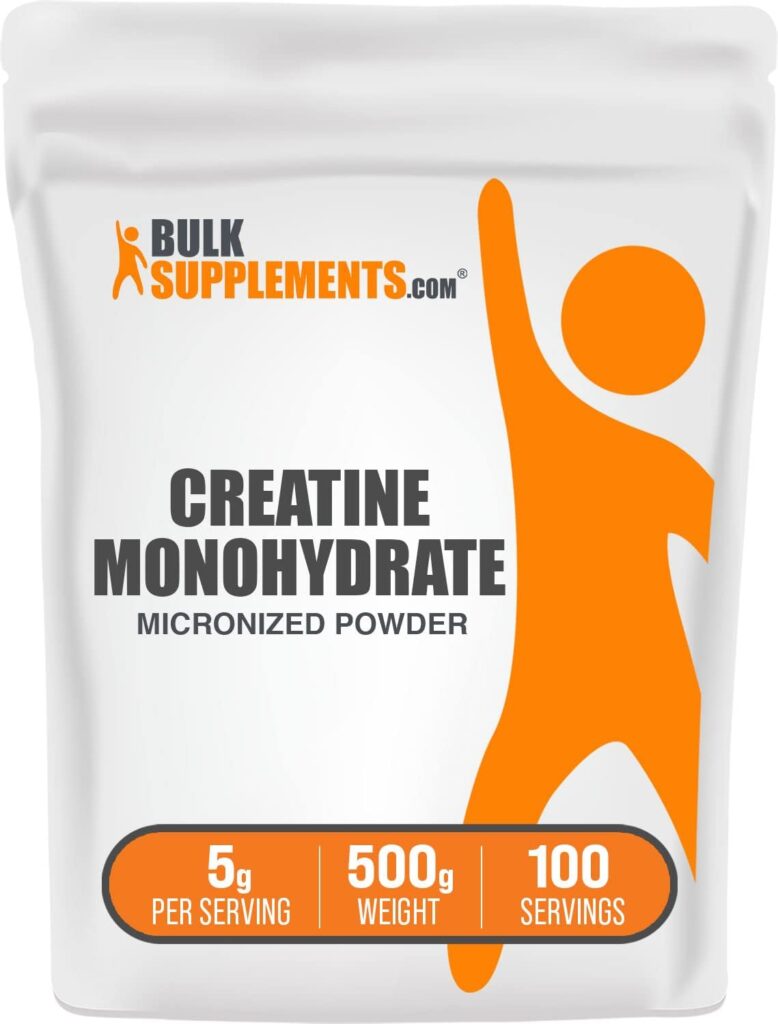
For those who prefer to buy in bulk, Bulk Supplements offers a large 1 kg bag of pure creatine monohydrate powder. This unflavored supplement is perfect for those who want to customize their dosage or mix it with other supplements.
It’s also lab-tested for purity and suitable for vegetarians and vegans.
Key Features:
- Pure creatine monohydrate
- Bulk packaging (1 kg)
- Lab-tested for purity
- Vegetarian and vegan-friendly
- Customizable dosage
3. Thorne Creatine
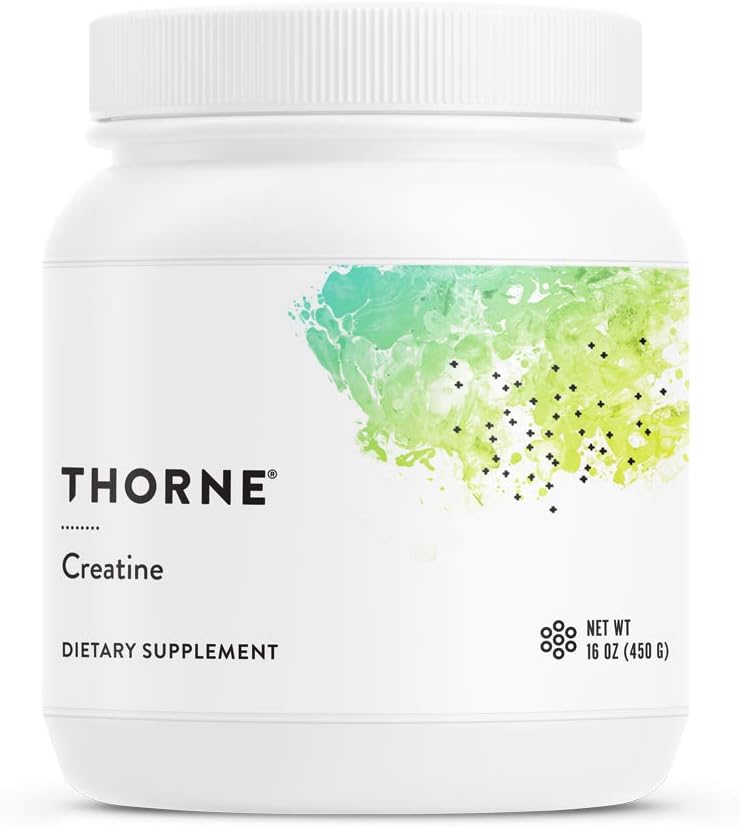
Thorne is known for its high-quality, pure supplements, and their creatine powder is no exception. This micronized creatine monohydrate is NSF Certified for Sport, making it a great choice for competitive athletes who undergo drug testing.
It’s free from gluten, dairy, and soy, catering to those with dietary restrictions.
Key Features:
- NSF Certified for Sport
- Micronized creatine monohydrate
- Gluten, dairy, and soy-free
- Suitable for competitive athletes
- High purity standards
4. Naked Nutrition Pure Creatine Monohydrate
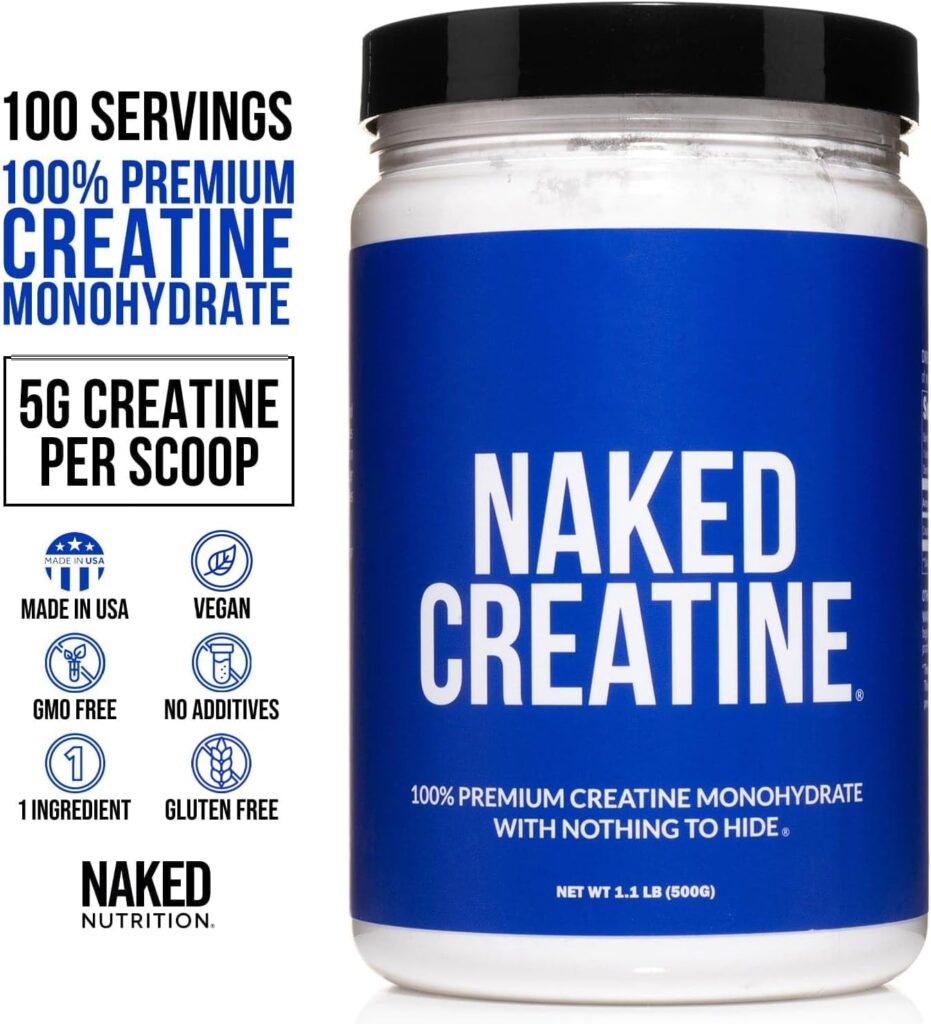
Naked Nutrition prides itself on offering pure, additive-free supplements. Their creatine monohydrate powder contains just one ingredient: pure creatine monohydrate.
It’s third-party tested and produced in the USA, ensuring high quality and purity.
Key Features:
- Single-ingredient formula
- Third-party tested
- Made in the USA
- No additives or fillers
- Transparent labeling
5. MuscleTech Platinum Creatine Monohydrate
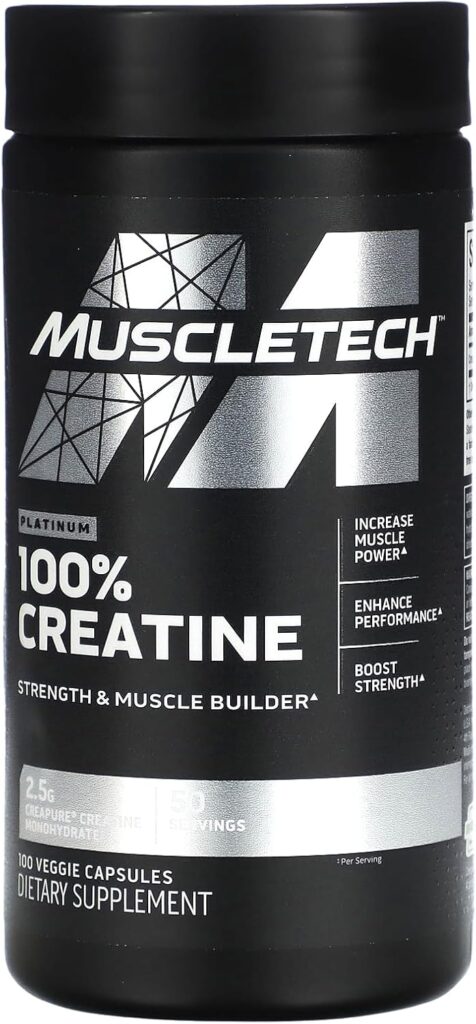
MuscleTech’s Platinum Creatine Monohydrate is a high-quality, micronized creatine powder that mixes easily with water or your favorite beverage. It’s unflavored and contains no fillers or additives, making it a pure and effective choice for those looking to enhance their athletic performance.
Key Features:
- Micronized creatine monohydrate
- Easy-mixing formula
- Unflavored
- No fillers or additives
- Trusted brand reputation
6. NOW Sports Nutrition Creatine Monohydrate
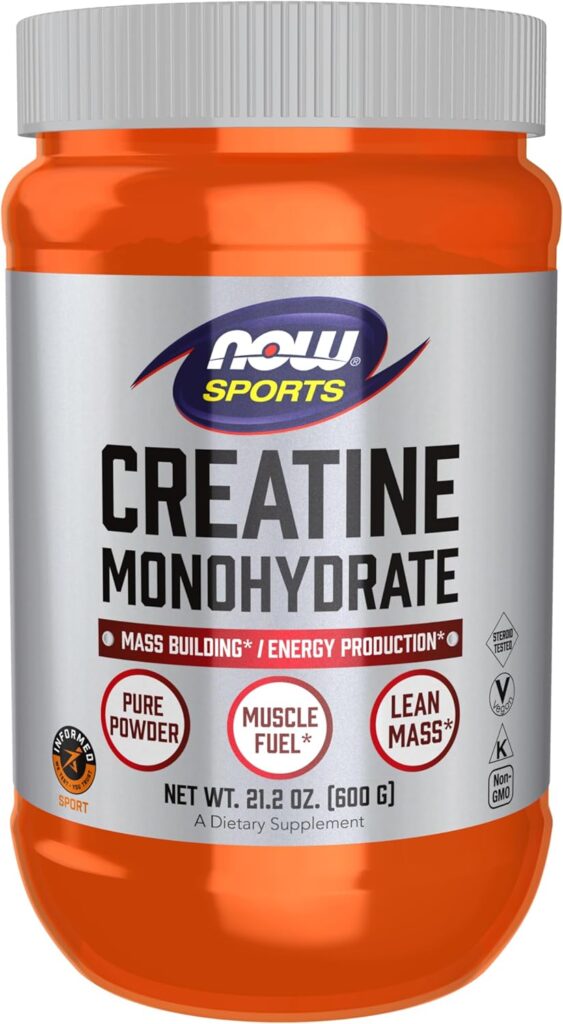
For those who prefer the convenience of capsules over powder, NOW Sports Nutrition offers creatine monohydrate in easy-to-swallow capsules. This product is perfect for those who don’t like the taste or texture of powder supplements or for those who travel often.
Key Features:
- Convenient capsule form
- Pure creatine monohydrate
- Easy to transport
- No mixing required
- Suitable for on-the-go use
7. Nutricost Creatine Monohydrate
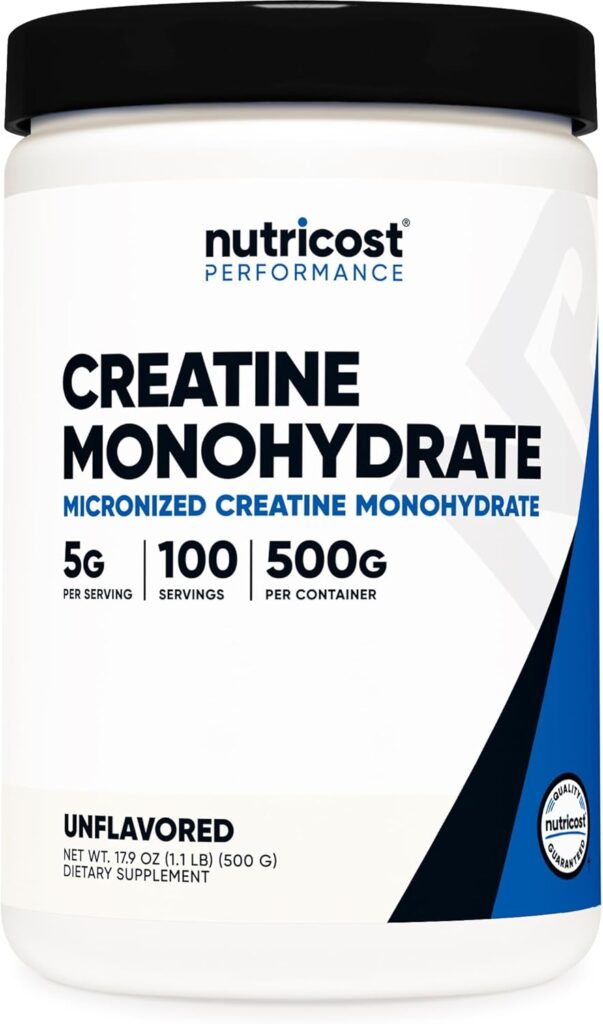
Nutricost offers a high-quality, micronized creatine monohydrate powder that’s both affordable and effective. With 5 grams of pure creatine per serving, this unflavored powder mixes easily with your favorite beverage.
It’s also third-party tested for purity and quality assurance.
Key Features:
- Micronized creatine monohydrate
- 5 grams per serving
- Third-party tested
- Affordable pricing
- Easy-mixing formula
8. Transparent Labs StrengthSeries Creatine HMB
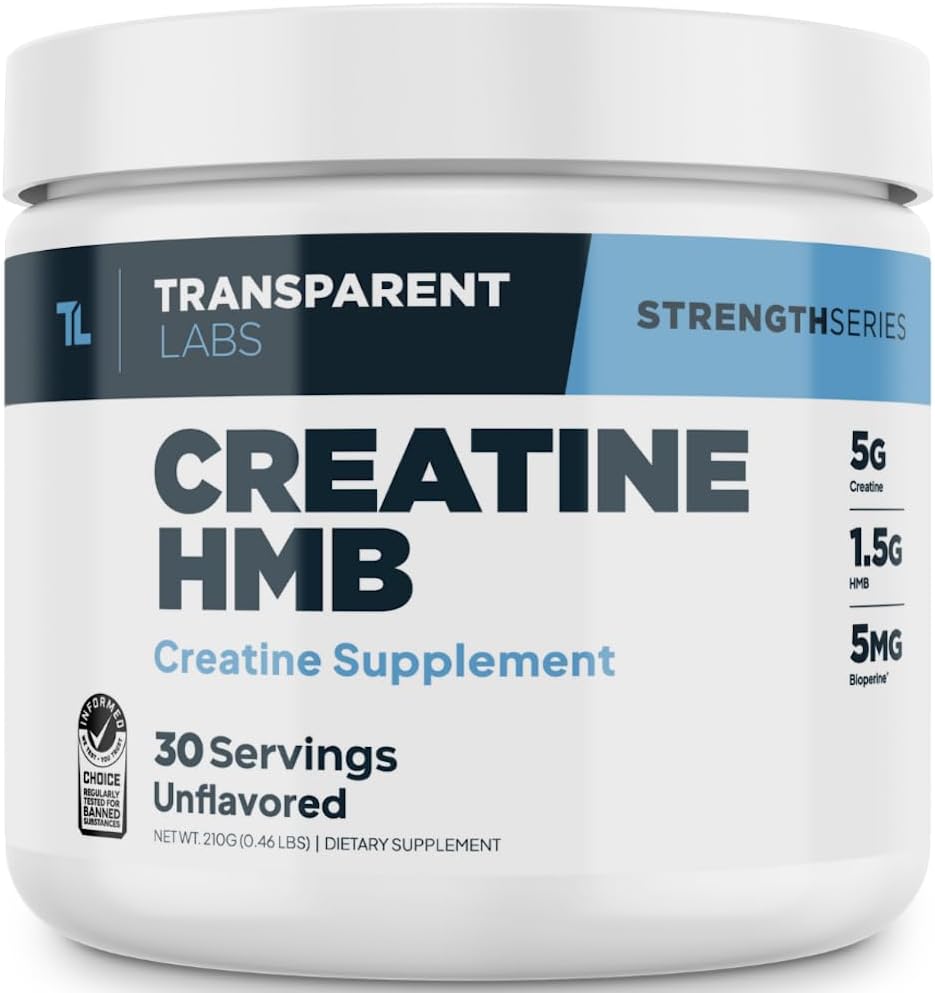
Rounding out our top 10 is Transparent Labs’ StrengthSeries Creatine HMB. This product combines creatine monohydrate with HMB (β-Hydroxy β-Methylbutyrate), a compound that may help reduce muscle protein breakdown.
This combination could potentially enhance the muscle-building and strength-increasing effects of creatine.
Key Features:
- Combination of creatine and HMB
- Potential for enhanced muscle growth
- Transparent labeling
- Unique formula
- Suitable for strength athletes
Implementing Creatine Supplementation: Best Practices
Now that we’ve explored the top creatine supplements, let’s talk about how to implement creatine supplementation effectively.
The Loading Phase Debate
Traditionally, many users start with a ‘loading phase’ of 20 grams per day for 5-7 days, followed by a maintenance dose of 3-5 grams daily. This approach can quickly saturate muscle creatine stores.
However, research has shown that simply taking 3-5 grams daily will achieve the same saturation over time, typically within 3-4 weeks. I personally prefer the gradual approach, as it’s easier on the digestive system and more sustainable in the long term.
However, if you’re looking for rapid results, the loading phase might be worth considering.
Timing Your Creatine Intake
The timing of creatine intake has been a subject of debate in the fitness community. Some argue that taking creatine pre-workout enhances performance, while others swear by post-workout supplementation for better recovery.
In reality, the most important factor is consistency. Taking creatine daily, regardless of the time, will lead to muscle saturation over time.
However, if you want to improve absorption, consider taking creatine with a meal that contains carbohydrates and protein. This can enhance insulin release, which may improve creatine uptake by muscle cells.
Cycling Creatine: Necessary or Not?
You might have heard about ‘cycling’ creatine – taking it for a period, then stopping for a while before starting again. However, current research doesn’t support the need for cycling. Creatine has been shown to be safe for long-term use, and cycling may actually reduce its benefits by allowing muscle creatine levels to drop during ‘off’ periods.
Staying Hydrated
Creatine draws water into your muscles, which is part of how it enhances performance. However, this means you need to confirm you’re drinking enough water when supplementing with creatine.
Aim to increase your water intake by at least 16 ounces per day when using creatine.
Common Pitfalls and How to Avoid Them
While creatine is generally safe and effective, there are some common mistakes that users make. Here’s how to avoid them:
Underdosing
Taking less than 3 grams per day may not provide optimal benefits. Stick to the recommended dose of 3-5 grams daily to confirm you’re getting the full effects of creatine supplementation.
Inconsistency
Creatine works best when taken consistently. Missing days can slow down the process of muscle saturation and reduce the overall effectiveness of your supplementation.
Make it a habit to take your creatine daily, just like you would any other important supplement or medication.
Mixing with Acidic Drinks
Creatine can break down in acidic environments. Avoid mixing it with citrus juices or other highly acidic beverages, as this can reduce its effectiveness.
Instead, mix your creatine with water, milk, or a neutral-pH sports drink for optimal absorption.
Expecting Immediate Results
While some users report feeling effects quickly, it typically takes 3-4 weeks of consistent use to see significant benefits. Be patient and consistent with your supplementation, and you’ll likely start noticing improvements in your strength and performance over time.
Neglecting Proper Nutrition and Training
Creatine is not a magic pill. It works best when combined with a balanced diet and consistent resistance training.
Make sure you’re eating enough protein, carbohydrates, and healthy fats to support muscle growth and recovery.
Additionally, maintain a challenging and progressive resistance training program to maximize the benefits of creatine supplementation.
Pro Tips for Maximizing Creatine Benefits
Pair with Beta-Alanine
Some research suggests that combining creatine with beta-alanine may lead to greater strength and lean mass gains than creatine alone. Beta-alanine is another popular supplement that can help improve muscular endurance, particularly during high-intensity exercise.
Consider Creatine for Cognitive Benefits
Emerging research suggests creatine may have cognitive benefits, particularly in vegetarians and older adults. Some studies have shown improvements in memory and cognitive processing speed with creatine supplementation.
If you’re looking to support both physical and mental performance, creatine might be a valuable addition to your supplement regimen.
Use Creatine Year-Round
Unlike some supplements that are best cycled, creatine can be taken continuously for ongoing benefits. Maintaining consistent creatine supplementation can help you sustain the performance and muscle-building benefits over the long term.
Experiment with Timing
While consistency is key, try taking creatine at different times (morning, pre-workout, post-workout) to see what works best for you. Some people find that taking creatine pre-workout gives them an extra boost during their training sessions, while others prefer post-workout supplementation for recovery.
Find what works best for your schedule and preferences.
Be Patient
The full benefits of creatine supplementation may take several weeks to manifest. Stick with it and trust the process.
Keep track of your progress in terms of strength gains, muscle growth, and overall performance to see how creatine is benefiting you over time.
Creatine and Different Training Goals
Bodybuilding
For bodybuilders, creatine can be a game-changer. It allows for increased training volume, which can lead to greater muscle hypertrophy over time.
The water retention associated with creatine use can also give muscles a fuller, more volumized appearance.
Strength Athletes
Powerlifters and Olympic weightlifters can benefit greatly from creatine’s ability to enhance ATP production. This can translate to increased strength and power output, allowing for heavier lifts and improved performance in competition.
Endurance Athletes
While creatine is often associated with strength and power sports, endurance athletes can also benefit. Creatine can help improve high-intensity intervals within endurance training, potentially leading to better overall performance.
Team Sport Athletes
Athletes in sports like football, basketball, or soccer can benefit from creatine’s ability to enhance both strength and power output, as well as its potential to improve recovery between high-intensity efforts.
Creatine for Special Populations
Vegetarians and Vegans
Since creatine is primarily found in animal products, vegetarians and vegans may have lower baseline creatine levels. Supplementation can be particularly beneficial for these groups, potentially leading to more pronounced improvements in strength and muscle mass.
Older Adults
As we age, our natural creatine stores tend to decrease. Supplementation can help older adults maintain muscle mass, strength, and potentially even cognitive function.
Women
While creatine research has historically focused more on men, studies have shown that women can benefit just as much from creatine supplementation. It can support strength gains, muscle growth, and recovery in female athletes and fitness enthusiasts.
Creatine and Health Considerations
Kidney Function
Despite some misconceptions, research has consistently shown that creatine supplementation does not negatively impact kidney function in healthy people. However, if you have pre-existing kidney issues, it’s always best to ask with a healthcare professional before starting any new supplement regimen.
Digestive Comfort
Some people may experience digestive discomfort when starting creatine supplementation, particularly during a loading phase. This can often be mitigated by starting with a lower dose and gradually increasing, or by splitting the daily dose into smaller servings throughout the day.
Hydration
As mentioned earlier, creatine draws water into the muscles. While this is part of its performance-enhancing effect, it also means you need to pay extra attention to hydration.
Make sure you’re drinking plenty of water throughout the day, especially during training sessions.
The Future of Creatine Research
While creatine is already one of the most well-researched supplements, scientists continue to explore its potential benefits beyond muscle and performance enhancement. Some areas of ongoing research include:
Neuroprotection
Some studies suggest that creatine may have neuroprotective properties, potentially benefiting individuals with neurological disorders or brain injuries.
Glucose Metabolism
Researchers are investigating creatine’s potential role in improving glucose metabolism, which could have implications for managing conditions like type 2 diabetes.
Bone Health
Preliminary research shows that creatine might play a role in supporting bone health, particularly when combined with resistance training.
As research continues, we may uncover even more benefits and applications for this versatile supplement.
Creatine Myths Debunked
Myth 1: Creatine is a Steroid
Creatine is not a steroid. It’s a naturally occurring compound found in small amounts in certain foods and produced by our bodies.
Unlike steroids, creatine does not affect hormone levels and is legal for use in sports.
Myth 2: Creatine Causes Kidney Damage
As mentioned earlier, many studies have shown that creatine supplementation does not harm kidney function in healthy people. However, those with pre-existing kidney issues should ask a healthcare professional before use.
Myth 3: Creatine is Only for Men
Creatine can benefit both men and women. While men may experience more dramatic muscle growth because of higher testosterone levels, women can still see significant improvements in strength, power, and muscle mass with creatine supplementation.
Myth 4: Creatine Causes Dehydration
While creatine does draw water into muscle cells, it doesn’t cause dehydration when proper hydration practices are followed. In fact, the increased water content in muscles may actually help maintain hydration during intense exercise.
Myth 5: You Need to Load Creatine
While a loading phase can saturate muscle creatine stores more quickly, it’s not necessary. Taking a standard dose of 3-5 grams daily will achieve the same results over time, typically within 3-4 weeks.
Choosing the Right Creatine for You
With so many options available, choosing the right creatine supplement can seem overwhelming. Here are some factors to consider:
Form
Creatine monohydrate is the most researched and cost-effective form. However, some people may prefer other forms like creatine HCL or buffered creatine for potential digestive benefits.
Purity
Look for products that have been third-party tested for purity and potency. This confirms you’re getting a high-quality product free from contaminants.
Mixability
If you’re sensitive to texture, consider a micronized creatine powder, which mixes more easily and has a smoother texture.
Additional Ingredients
Some products mix creatine with other performance-enhancing ingredients. While these can be useful, they may also be more expensive.
Consider whether you need these additional ingredients or if you’d prefer a pure creatine product.
Brand Reputation
Choose products from reputable brands with a history of producing high-quality supplements. Look for customer reviews and third-party certifications.
Cost
While it’s important to invest in a quality product, creatine doesn’t need to break the bank. Compare prices per serving to find the best value.
Integrating Creatine into Your Supplement Stack
Creatine can be effectively combined with other supplements to enhance your overall fitness and performance goals. Here are some common supplement pairings:
Protein Powder
Combining creatine with protein powder can support muscle growth and recovery. You can easily mix both into your post-workout shake.
Beta-Alanine
As mentioned earlier, beta-alanine can complement creatine’s effects, potentially leading to greater strength and lean mass gains.
Caffeine
While some older studies suggested that caffeine might interfere with creatine absorption, more recent research shows that this isn’t a significant concern. Many pre-workout supplements mix creatine and caffeine for enhanced performance.
Electrolytes
Given creatine’s effect on muscle hydration, pairing it with an electrolyte supplement can help confirm proper hydration and mineral balance, especially during intense training.
Remember, while these combinations can be useful, it’s always a good idea to introduce new supplements one at a time. This allows you to assess your body’s response to each individual supplement.
Key Takeaways
- Creatine monohydrate is the most researched and effective form of creatine.
- Consistency is crucial – aim for 3-5 grams daily.
- Creatine works best when combined with resistance training and a balanced diet.
- Stay hydrated when supplementing with creatine.
- Be patient – it may take 3-4 weeks to see significant benefits.
Are Creatine Supplements and Nootropics Both Effective for Enhancing Cognitive Function?
When it comes to enhancing cognitive function, many people wonder if creatine supplements and best rated nootropics are equally effective. While creatine is known for improving physical performance, best rated nootropics are specifically designed to boost brain function. Both have shown positive results in enhancing cognitive function, but further research is needed for a direct comparison.
People Also Asked
What is the best time to take creatine?
The most important factor is consistency. Taking creatine daily, regardless of the time, will lead to muscle saturation over time.
However, taking it with a meal containing carbohydrates and protein may enhance absorption.
Can creatine cause weight gain?
Creatine can cause a slight increase in weight because of increased water retention in muscles. This is typically 2-4 pounds and is not fat gain.
Is creatine safe for teenagers?
While creatine is generally considered safe, teenagers should ask with a healthcare professional before starting any supplement regimen.
Does creatine affect hair loss?
There’s no strong scientific evidence linking creatine supplementation to hair loss. Some studies have shown a slight increase in DHT (a hormone linked to hair loss) with creatine use, but the clinical significance of this is unclear.
Can women take creatine?
Yes, women can and often do benefit from creatine supplementation. It can help improve strength, power, and muscle mass in women just as it does in men.
How long does it take for creatine to work?
While some people may notice effects within a week, it typically takes 3-4 weeks of consistent supplementation to see significant benefits.
Is creatine vegan-friendly?
Most creatine supplements are vegan-friendly as they are synthetically produced. However, always check the label to be sure.
Can I take creatine if I don’t work out?
While creatine is most beneficial when combined with exercise, some research suggests it may have cognitive benefits even without exercise. However, for optimal results, it should be combined with resistance training.
Does creatine need to be cycled?
Current research doesn’t support the need for cycling creatine. It’s considered safe for long-term use without cycling.
Can creatine be mixed with protein powder?
Yes, creatine can be safely mixed with protein powder. This can be a convenient way to take both supplements together.
